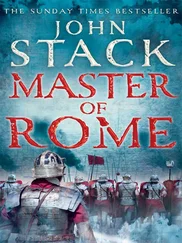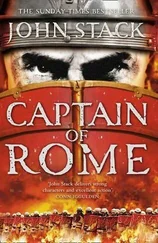At the northern end of the fleet a number of Roman galleys were already racing towards the beach, skirting that end of the city in order to beach their ships and escape on land. Gisco had anticipated a possible fight on land and so had deployed two thousand soldiers within the city. With the Romans in disarray, their capture was inevitable. Gisco laughed out loud at the sight of the remaining galleys attempting to turn to engage his own fleet. No more than four ships had got under way in a manner that seemed to suggest competency and, as he watched, one of them endeavoured to ram a Carthaginian trireme one hundred yards off his starboard bow. The Roman’s trajectory was hopelessly inaccurate and the ram merely bounced off the heavier hull of the target. Gisco smiled malevolently as the crew of the Carthaginian trireme grappled the Roman ship and boarded her, reversing the attack the Romans had forfeited through their incompetence.
The smile was once more wiped from Gisco’s face as his eyes searched for the other three ships that were showing signs of a determined resistance.
‘Orders to the helm,’ he shouted, ‘turn two degrees starboard. Intercept and ram the Roman ship closest to the dock.’
Seconds later, the course of the Melqart adjusted under Gisco’s feet as the quinquereme pointed her bow at a gap left in the centre of the Roman line by one of the few ships that had had the good sense to break formation and give themselves steerage space. As the galley raced through the gap, Gisco looked left and right to the Roman triremes. The starboard ship was entangled with another, while the port one seemed simply incapacitated by the total panic of her crew.
‘Archers!’ Gisco shouted, his men immediately loosing volley after volley into the stricken crews, their aim deadly at the short range.
The Melqart emerged from the gap at attack speed, her course once again changing as the helmsman bore down on the lone Roman trireme ahead of them. Gisco felt the surge of pace as the galley moved to ramming speed. He looked down at the six-foot bronze ram splitting the wave tops in front of the rushing galley, its squared face racing ahead of the ship in its haste to sink itself into the enemy’s hull. Gisco raised his eyes once more to the Roman galley, desperately trying to flee parallel to the shoreline. He sheathed his sword and gripped the rail before him, tensing his body for the impending impact. At fourteen knots the momentum of the ship would drive all six feet of the ram into the Roman galley.
Scipio felt the deck of the Mars heel over beneath him as he watched the Carthaginian quinquereme speed through the Roman line. He spun around to look for Fulfidias, enraged that the captain was looking for an avenue of escape when all around them Roman galleys were locked in a chaotic, desperate fight with the Carthaginians. The enemy were spreading out to pick off individual targets and, as Scipio watched, a Carthaginian galley rammed a Roman trireme amidships, the crack of the impact filling the air, the sound immediately followed by the dread cry of the Punici boarding party as they swept onto the stricken ship. Scipio knew that if the Mars was to survive she needed to turn into the fight, not flee before it, and his eyes searched the aft-deck for the spineless captain.
The first drop in speed came suddenly, a barely perceptible drain, as if the galley had somehow snagged on an underwater obstacle that was sapping her strength. Scipio immediately noticed the change and he searched for the cause, his mind suddenly registering the ever-increasing whip cracks from the slave decks below as the rowers were whipped to comply with the impossible task of maintaining ramming speed, an order issued by Fulfidias the moment the oars had engaged over five long minutes before. Scipio cursed the idiot, realizing he had expected Fulfidias to be every bit as competent as the captain of the Aquila.
‘Commander,’ Scipio said, his praetorian guard standing by his side with their shields raised, ‘form up around me. We are about to be boarded.’
The commander saluted and the ten praetorian guards formed a ring around the consul, their black scutum shields creating a fortification against the coming onslaught. Scipio looked to the main deck to see the legionaries of the Fourth formed up ready to repel the enemy. Their faces were set in the legionaries’ blank expression of battle, discipline holding them firm, bravery giving them resolve. The senior consul turned again to the enemy ship. It was upon them.
The six-foot ram of the Melqart struck the side of the Mars with a terrifying crack, its unyielding bronze striking deep in a killer blow that drove to the very core of the smaller ship. The ram split the deck beneath the rowers, crushing the slaves like grain under a millstone, their cries mingling with the tortured sound of the ship. The momentum of the Carthaginian galley drove the trireme up onto the cutwater of the larger ship, the impact throwing all on the deck of the Mars off their feet, as if the hammer of Vulcan had fallen amongst them.
Like a dark wave of Hades, the Carthaginians spilled over the forerail of the Melqart onto the deck of the Roman galley, their war cries renewed in the battle frenzy of attack. The men of the Fourth were immediately on their feet, but they found themselves instantly overwhelmed, their sixty outmatched by the scores of Punic warriors still pouring from the Carthaginian flagship. Within minutes each legionary was fighting for his life. All sense of order was lost in the Roman ranks as men fought desperately against overpowering odds. The lone voice of a Roman centurion cut through the air to rally his legionaries into a coherent unit and the men summoned innate battle tactics as they tried to adopt a unified defensive position, their career-long training giving them a moment’s respite. It did not last.
The Carthaginians pressed home their attack on the main deck, their superior numbers and ferocity keeping the balance firmly on their side. The Romans struggled to build an effective defensive wall on the confined deck, and time and again their flanks were exposed. The Roman commander’s attempt to rally his troops died on the end of a Punic sword and, to the last man, the legionaries of the Fourth fell under the Carthaginian assault.
Scipio took another step backwards as a fresh wave of Carthaginians attacked his small band of praetoriani. They had been largely ignored during the Carthaginians’ first onslaught, with only individuals or small groups of two and three peeling off from the main attack to seek out other targets on the blood-soaked deck. His guard was down to seven men, a pitiful number that would be instantly overwhelmed the moment the legionaries’ defence collapsed on the main deck, freeing the entire Carthaginian horde to seek out new prey. Scipio stumbled over an inert body as he moved towards the stern rail and he looked down to see the captain, Fulfidias, lying supine on the deck, an arrow buried deep in his neck. His face was fixed in a grotesque scream, the expression robbing him of dignity, revealing the terror the man had experienced at the moment of death. Scipio spat on the man, cursing his incompetence.
Another of Scipio’s guards fell and a Carthaginian warrior charged through the gap, his sword raised for the killing blow. Scipio deftly sidestepped the swipe and brought his own dagger up in an underhand blow into the lower back of his attacker. The knife drove deep into the kidneys of the Carthaginian, a gush of dark blood confirming the strike. Scipio twisted the knife and withdrew it, pushing the man aside and readying himself for the next attack. A cheer from the main deck signalled the final defeat of the legionaries and the knot of men on the main deck dispersed to fan out over the ship. Scipio spotted a large group heading for the aft-deck and he bent down to pick up the sword of a fallen praetorian, stepping forward into the line formed by the four remaining guards, ready to die with his men.
Читать дальше
Конец ознакомительного отрывка
Купить книгу











